The 10 Best Conversation Analytics Software in 2025
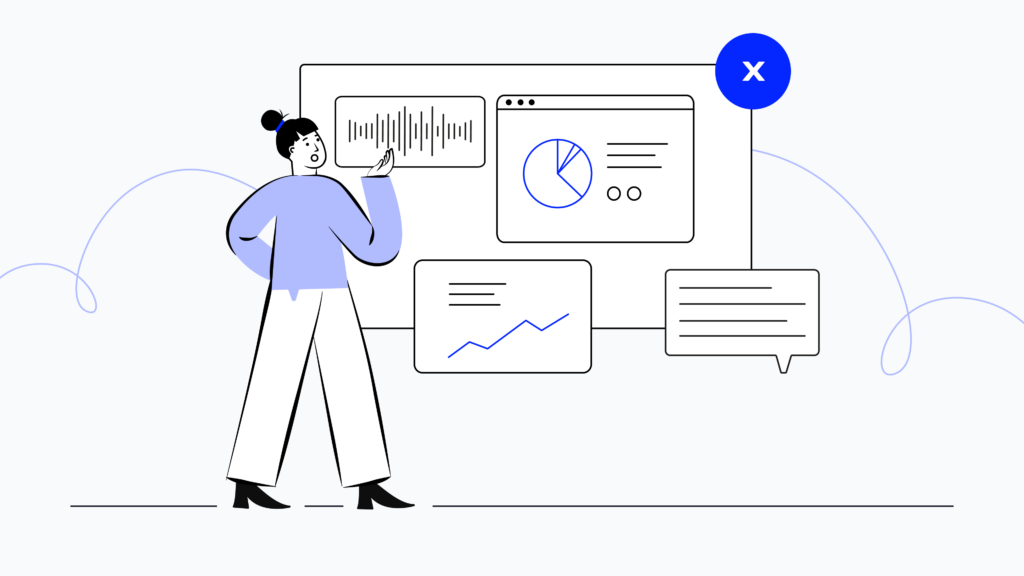
From wartime codebreakers to modern AI analyzing customer sentiment, understanding human conversation has driven innovation for decades.
Early businesses relied on manual notes and memory. Sales teams guessed which phrases closed deals. Support managers sampled random calls hoping to spot trends.
Today’s conversation analytics software transforms this landscape. AI processes thousands of interactions instantly, turning dialogue into strategy. Sales teams spot winning patterns. Support leaders identify issues early. Managers coach with precision.
This shift democratizes customer intelligence. Small and mid-sized businesses now access enterprise-grade insights, turning everyday conversations into growth drivers.
This guide examines the leading platforms shaping business communication. You’ll discover how AI transforms customer interactions into action, which features impact revenue, a detailed platform analysis, and a strategic selection framework
Key Takeaways:
- CloudTalk stands out as the most cost-effective solution for SMBs, combining conversation analytics with superior call quality and global coverage at a fraction of competitors’ prices.
- When selecting conversation analytics software, prioritize AI accuracy and integration capabilities over feature quantity – tools that work seamlessly with existing systems deliver faster ROI.
- Companies see the best results when implementing conversation analytics alongside clear coaching frameworks rather than relying solely on automated insights.
- The shift toward AI agents in conversation analytics suggests businesses should choose platforms that offer both analysis and automation capabilities to future-proof their investment.
Unlock Hidden Insights in Every Call With a 14-Day Free Trial
What Is Conversation Analytics Software?
ELIZA, the first chatbot*, could only ask, “How does that make you feel?” Sales teams faced similar limitations. They relied on manual note-taking, gut feelings, and incomplete data to gauge call success. Missing crucial details meant missing revenue opportunities.
Fast forward to today. Modern conversation analytics software transforms every customer interaction into actionable insights.
Teams capture exact moments when prospects show buying signals. Support agents identify customer frustration before escalation. Managers spot coaching opportunities within seconds of call completion.
The system processes conversations through multiple analytical layers:
- Speech Recognition: Converts spoken dialogue into searchable text
- Pattern Analysis: Identifies common topics, questions, and objections
- Sentiment Detection: Gauges emotional tone and engagement levels
- Predictive Modeling: Forecasts outcomes based on conversation patterns
Different industries leverage this conversation intelligence in unique ways. Sales teams track competitive mentions and buying signals. Customer service departments monitor satisfaction trends. Healthcare providers ensure compliance during patient interactions. Financial institutions detect risk factors in client communications. eCommerce companies analyze customer journey touchpoints.
10 Top Conversation Analytics Software Solutions
(Introduce the list, highlighting key factors such as accuracy, ease of use, and pricing.)
1. CloudTalk
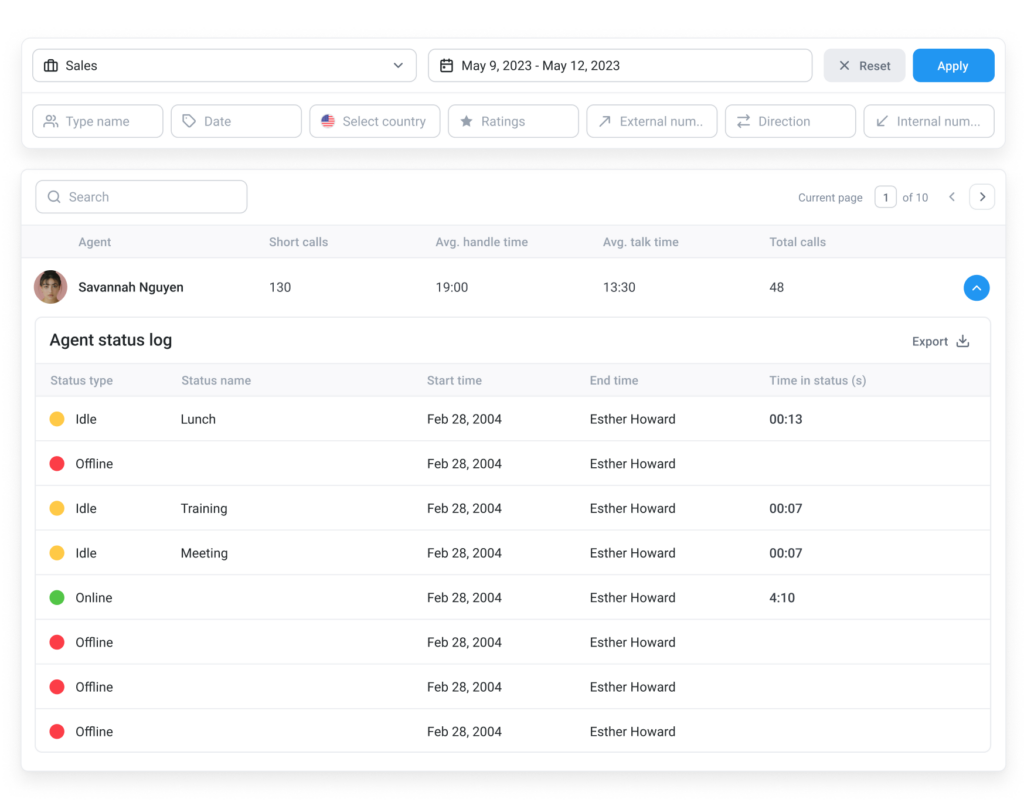
CloudTalk transforms sales and support conversations into actionable AI-powered business intelligence. This cloud-based phone system offers native conversation analytics, eliminating the need for separate tools and reducing technology costs.
Key Features:
- AI-powered call summaries and automatic tagging create searchable conversation records
- Real-time sentiment analysis flags critical moments during customer interactions
- Custom analytics dashboards track talk-listen ratios and conversation patterns
- Two-way sync with major CRMs ensures data flows seamlessly between systems
- Global coverage across 160+ countries with crystal-clear call quality
Pros & cons
Pros:
- All-in-one solution combines calling capabilities with conversation intelligence
- Extensive integration ecosystem
- Superior international call quality
Cons:
- Newer AI features compared to specialized analytics tools
- Learning curve for advanced analytics features
- Mobile app has limited analytics capabilities
Pricing:
- Lite: 19 $
- Starter:34 $
- Essential: 39 $
- Expert: 69 $
Best For: Growing SMBs that need both a reliable phone system and conversation intelligence. Particularly valuable for international teams requiring clear calls across multiple countries.n points, helping teams optimize their workflows and increase resolution efficiency.
Level Up Your Conversation Intelligence
2. Gong
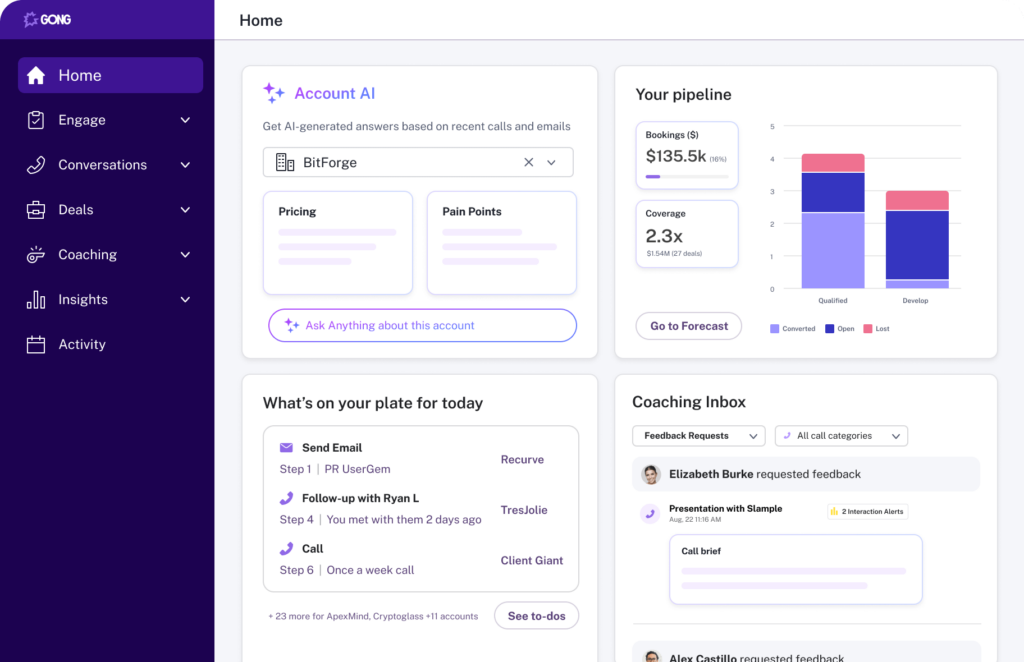
Known as “the revenue intelligence platform,” Gong combines conversation analysis with deal intelligence. Its AI engine processes sales calls, emails, and web conferences to predict deal outcomes and guide revenue strategies.
Key Features:
- Deal pipeline analytics with risk scoring and opportunity tracking
- Automated analysis of competitor mentions and pricing discussions
- Custom scorecards for coaching and performance tracking
- Market intelligence based on aggregated conversation trends
- Advanced integration with Salesforce and other major CRMs
Pros & cons
Pros:
- Deep sales-specific analytics capabilities
- Robust coaching and training features
- Extensive market intelligence data
Cons:
- Significant investment required
- Complex implementation process
- Better suited for larger sales teams
Pricing:
- Custom pricing based on team size
- Typically starts at $1,000+ per month
- Annual contract required
Best For: Enterprise sales organizations with large teams and complex sales cycles. Ideal for businesses heavily invested in data-driven sales strategies.
3. Chorus (ZoomInfo)
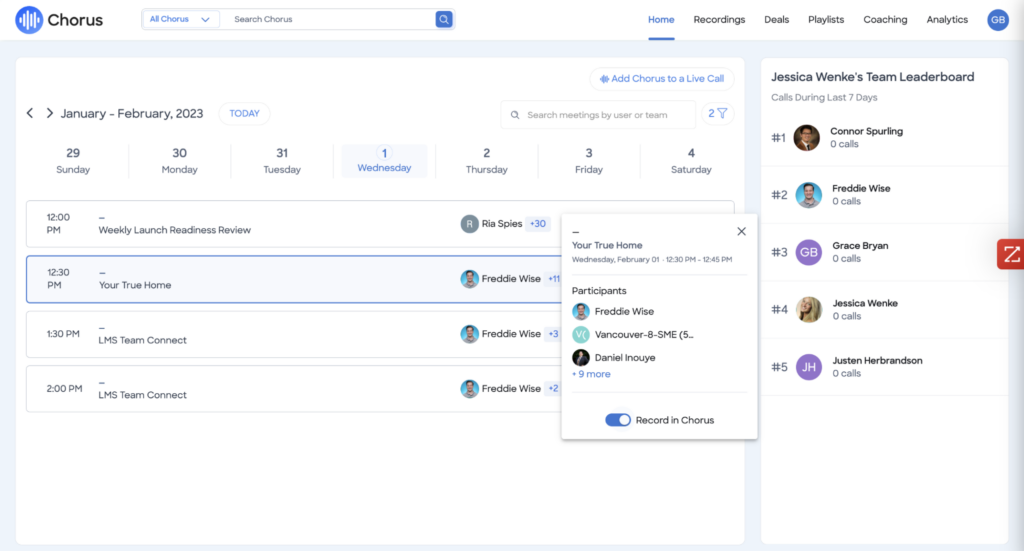
Part of ZoomInfo’s revenue platform, Chorus specializes in conversation analytics for B2B sales teams. The platform emphasizes deal momentum tracking and sales methodology adherence.
Key Features:
- Moment identification for key discussion points
- Deal risk analysis based on conversation patterns
- Smart playlists for training and onboarding
- Real-time coaching cards during calls
- Native integration with ZoomInfo’s B2B database
Pros & cons
Pros:
- Strong B2B focus
- Extensive training library
- Deep ZoomInfo data integration
Cons:
- Requires ZoomInfo subscription for full benefits
- Limited support options
- Higher price point for small teams
Pricing:
- Contact sales for custom pricing
- Bundled with ZoomInfo subscriptions
- Enterprise-focused pricing model
Best For: B2B sales teams already using ZoomInfo who need deep conversation insights integrated with their existing tech stack.
4. Outreach
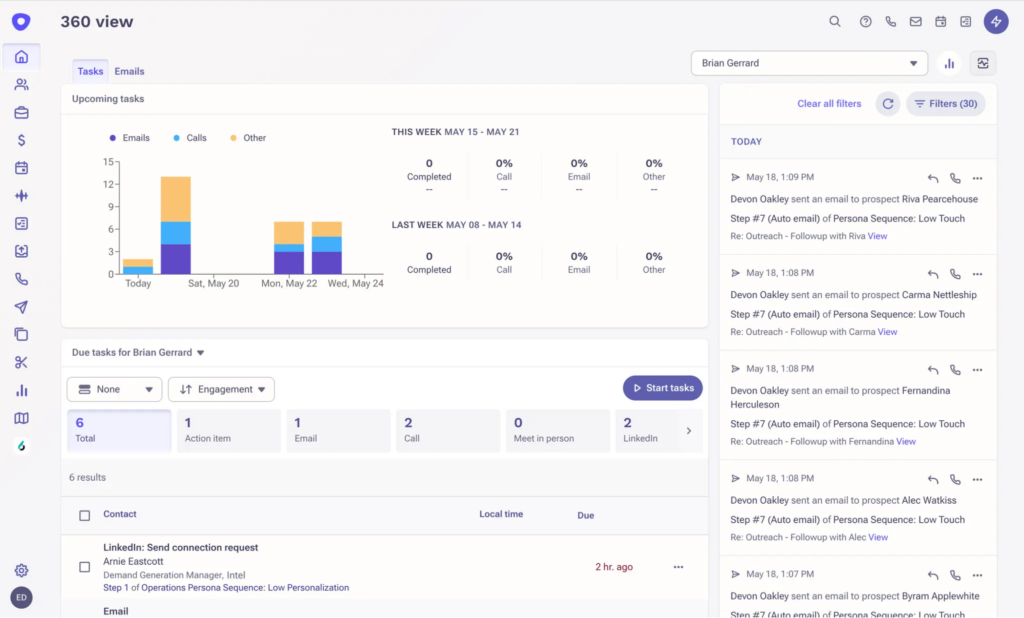
Outreach has evolved from a sales engagement platform to include robust conversation intelligence. The platform focuses on revenue execution, combining sales sequences with AI-powered conversation analysis.
Key Features:
- Guided selling based on conversation insights
- Success patterns from top-performing reps
- Real-time battle cards for competitive mentions
- Automated sequence optimization
- Deal health monitoring through conversation signals
Pros & cons
Pros:
- Seamless integration with sales workflows
- Strong automation capabilities
- Multi-channel analytics
Cons:
- Complex pricing structure
- Requires full platform adoption
- Feature overlap with existing tools
Pricing:
- Contact sales for custom pricing
- Additional costs for AI features
- Enterprise pricing available
Best For: Sales organizations looking to combine engagement automation with conversation intelligence in one platform.
5. Dialpad
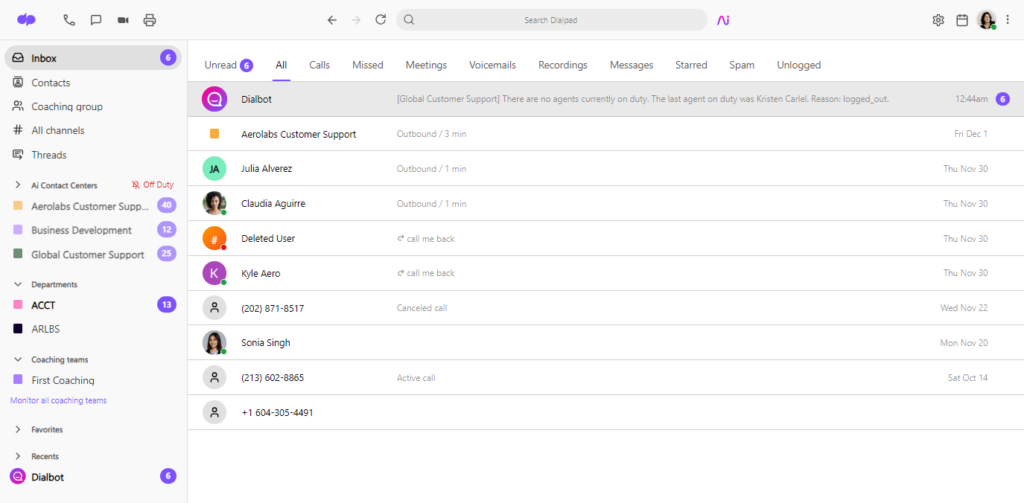
Dialpad offers AI-native communications with built-in conversation analytics. The platform emphasizes real-time assistance and automated post-call analysis.
Key Features:
- Live coaching with real-time recommendations
- Automated call summaries and action items
- Sentiment tracking across customer journey
- Voice intelligence for trend analysis
- Native video meeting analytics
Pros & cons
Pros:
- Real-time insights during calls
- Unified communications platform
- Strong mobile experience
Cons:
- Call quality issues reported
- Limited customization options
- Basic reporting features
Pricing:
- Standard: $15 user/month
- Pro: $25 per user/month
- Enterprise: Quote-based
Best For: Companies seeking unified communications with integrated conversation analytics capabilities.
6. JustCall
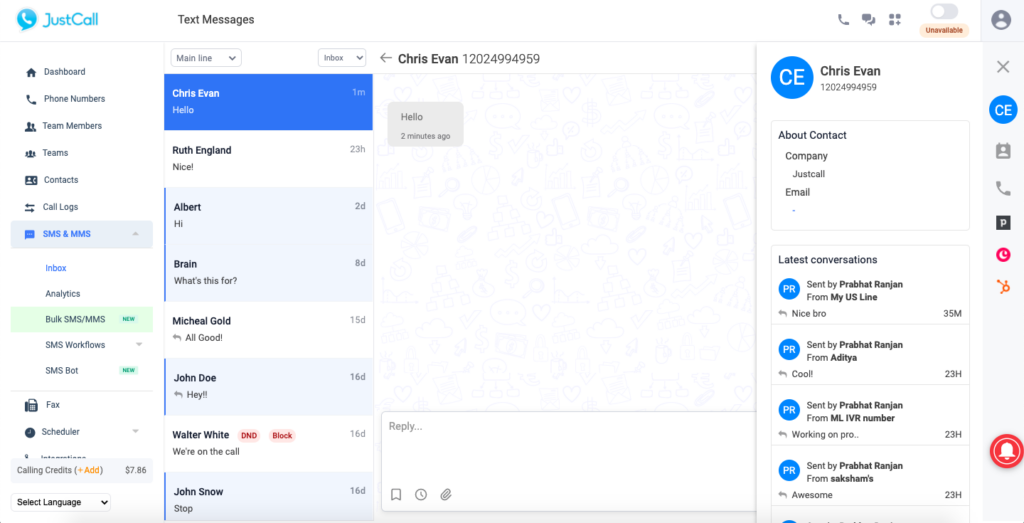
JustCall combines a cloud phone system with conversation intelligence capabilities focused on small business needs.
Key Features:
- Basic sentiment analysis for calls
- Automated call scoring and transcription
- Performance analytics dashboards
- SMS campaign analytics
- Integration with popular CRM platforms
Pros & cons
Pros:
- Simple user interface
- Affordable starting price
- Quick implementation
Cons:
- Limited advanced analytics
- Basic AI capabilities
- Restricted customization options
Pricing:
- Essentials: $19 per user/month
- Team: $29 per user/month
- Pro: $49 per user/month
- Business: Quote-based
Best For: Small businesses needing basic conversation analytics integrated with their phone system.
7. CallMiner Eureka
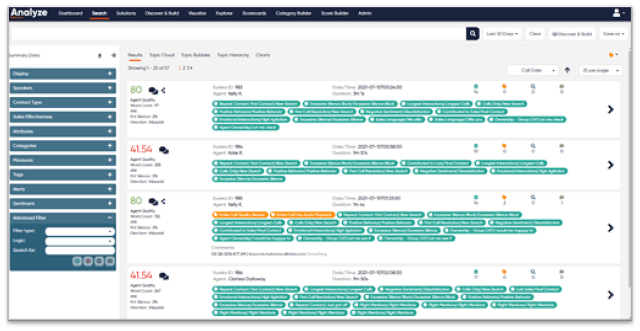
A specialized analytics platform focusing on contact center interactions and customer experience insights.
Key Features:
- Omnichannel interaction analytics
- Root cause analysis tools
- Automated scoring systems
- Compliance monitoring
- Predictive behavioral analytics
Pros & cons
Pros:
- Deep analytical capabilities
- Strong compliance features
- Extensive customization options
Cons:
- Steep learning curve
- Complex implementation
- Higher price point
Pricing:
- Custom enterprise pricing
- Module-based licensing
- Annual contracts required
Best For: Large contact centers and enterprises requiring comprehensive interaction analytics across multiple channels.
8. Convin
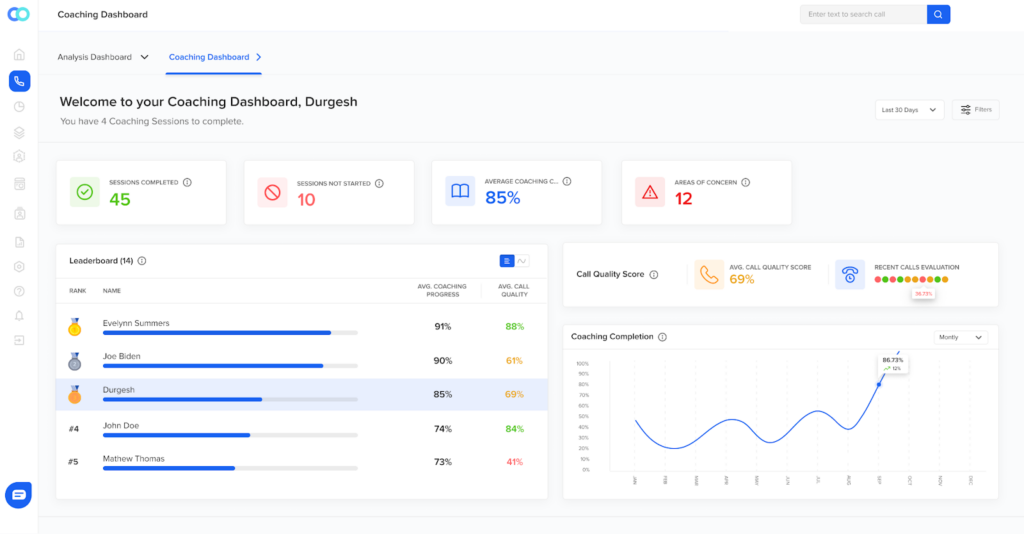
An emerging player focused on sales conversation intelligence with an emphasis on coaching and revenue optimization.
Key Features:
- Deal intelligence tracking
- Automated conversation scoring
- Sales battlecard creation
- Revenue opportunity alerts
- Personalized coaching insights
Pros & cons
Pros:
- User-friendly interface
- Affordable for small teams
- Quick setup process
Cons:
- Limited integration options
- Basic reporting capabilities
- New market entrant
Pricing:
- Contact sales for custom pricing
Best For: Growing sales teams looking for affordable conversation intelligence with coaching capabilities.
9. Iovox
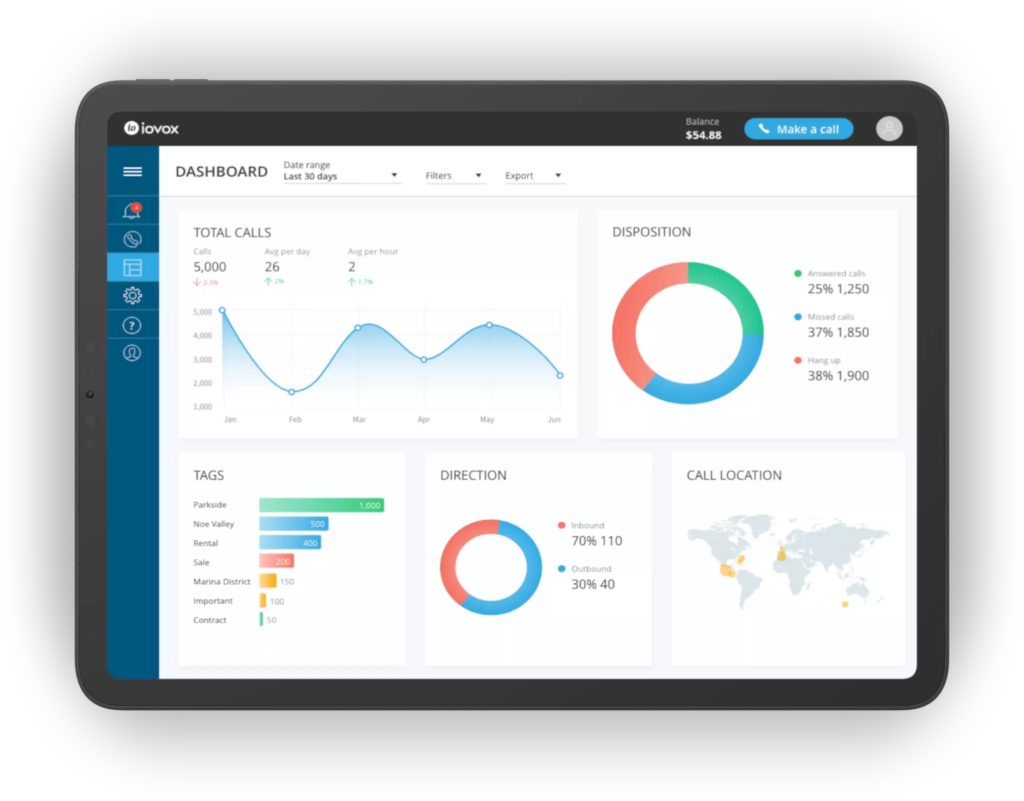
Focuses on conversation analytics with a strong emphasis on call tracking and marketing attribution.
Key Features:
- Call tracking analytics
- Marketing campaign insights
- International number coverage
- Webhook integrations
- Custom reporting tools
Pros & cons
Pros:
- Strong marketing focus
- Detailed attribution tracking
- Global coverage
Cons:
- Limited AI capabilities
- Basic conversation analytics
- Dated interface
Pricing:
- Professional: $500/month
- Enterprise: $2,000 month
Best For: Marketing teams needing call tracking with basic conversation analytics capabilities.
10. EnthuAI
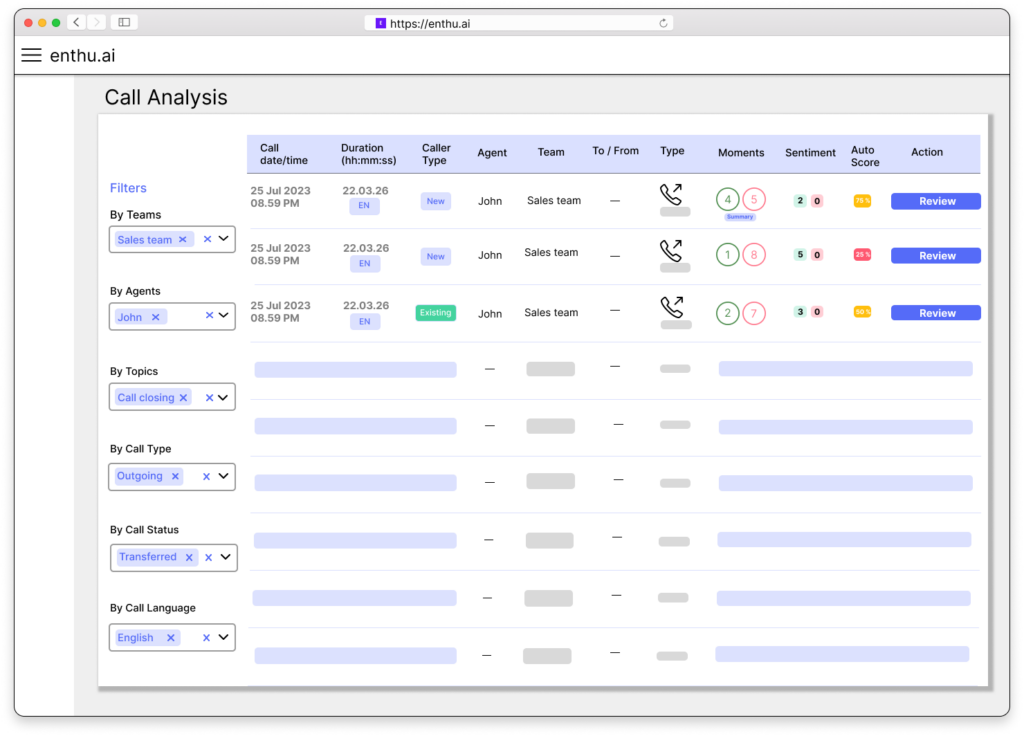
A new AI-focused conversation intelligence platform targeting small to medium businesses.
Key Features:
- GPT-powered conversation analysis
- Real-time coaching suggestions
- Automated meeting summaries
- Topic clustering
- Customer intent detection
Pros & cons
Pros:
- Modern AI technology
- Competitive pricing
- Regular feature updates
Cons:
- Limited track record
- Basic integration options
- Small feature set
Pricing:
- Contact sales for a quote
Best For: Tech-savvy teams wanting to experiment with the newest AI conversation analytics capabilities.
Benefits of Using Conversation Analytics Software
Small and mid-sized businesses face a turning point in customer communication.* Market data shows growing adoption of conversation intelligence solutions by SMBs.
The shift makes sense – while enterprise companies employ large QA teams, smaller businesses need smart tools to compete effectively.
These teams discover that conversation analytics isn’t just about monitoring calls. It’s about uncovering opportunities that drive growth.
Improved Customer Satisfaction
Smart Routing matches customers with the right agents based on conversation history and expertise. Real-time sentiment analysis alerts managers when conversations turn negative. Teams identify and resolve systemic issues before they affect satisfaction scores.
Higher Agent Productivity
Automated call summaries eliminate manual note-taking. Real-time coaching suggestions help agents navigate complex conversations. Performance metrics highlight specific areas where agents need support, making training more targeted and effective.
Better Sales & Lead Qualification
Sales teams spot buying signals across thousands of conversations. The system flags prospects showing high intent, helping prioritize follow-ups. Historical conversation patterns reveal which approaches convert best, letting teams replicate successful strategies.
Stronger Compliance & Risk Management
Automated monitoring catches compliance issues in real-time. The system flags problematic language or missing disclosures immediately. Teams can prove adherence to regulations with comprehensive conversation records.
Data-Driven Business Decisions
Teams identify which conversation topics lead to closed deals. Analysis reveals which competitor mentions cause lost opportunities. Clear metrics show how pricing discussions impact conversion rates. Managers can pinpoint when and why deals get stuck in the pipeline, enabling targeted process improvements.
See Conversation Analytics in Action
How to Choose the Right Conversation Analytics Software
The switch from landlines to cloud calling sparked a revelation. Support and sales teams suddenly realized they were sitting on goldmines of conversation data.
But tapping into these insights meant navigating a complex landscape of AI tools, each promising revolutionary analytics.
Mike discovered this firsthand when his software company outgrew basic call tracking. His sales team closed deals faster than ever, but they couldn’t pinpoint why some strategies worked better than others.
Call recordings piled up, full of insights they couldn’t access. Each vendor demo added more questions than answers, but here’s what he found:
- Accuracy of AI Transcription & Sentiment Analysis: Not all AI engines perform equally. Look for tools that handle industry-specific terminology and multiple accents. Test accuracy rates with sample calls from your team. Check how well the system catches emotional nuances and conversation flow.
- Integration Capabilities: The tool should fit seamlessly into your existing workflow. Verify compatibility with your CRM system. Check how call data syncs with your sales or support platform. Consider whether the integration offers two-way data flow to avoid manual updates.
- Customizable Reporting & Dashboards: Different teams need different insights. Sales managers want deal intelligence and conversion metrics. Support leaders focus on satisfaction scores and resolution rates. Ensure the platform lets you build custom views for various stakeholders.
- Security & Compliance Features: Customer conversations contain sensitive data. Verify the platform’s compliance with regulations relevant to your industry. Look for security features like data encryption, access controls, and automatic PII redaction. Check where data gets stored and how long it’s retained.
- Scalability & Cost Considerations: Your needs will grow as your team expands. Understand pricing tiers and user limits. Check costs for additional features or storage. Consider whether the platform can handle increased call volume without performance issues.
Looking Forward: The Evolution of Conversation Intelligence
The distinction between AI assistants and conversation analytics tools blurs. Forward-thinking platforms are already experimenting with AI agents that both analyze calls and actively participate in them. These systems handle routine inquiries, qualify leads, and even negotiate basic terms.
This creates new possibilities. Support teams deploy AI agents for tier-1 issues while human agents focus on complex problems. Sales teams use AI to qualify leads 24/7, expanding into new markets without adding headcount. The analytics become predictive rather than reactive, suggesting next best actions before conversations even begin.
But the human element remains crucial. The most successful teams use conversation analytics to enhance rather than replace human interactions. They combine AI insights with emotional intelligence, using data to make conversations more meaningful rather than more automated.
The key lies in choosing tools that align with this future. Platforms that offer both robust analytics and AI agent capabilities position businesses for the next wave of customer engagement. The goal isn’t just to understand conversations better –it’s to make every interaction count, whether handled by AI or humans.
Limited Time Power-Up: 50% Off Your First Month Jump Start Your Conversation Analytics Journey
Sources:
FAQs
What are conversation analytics?
AI-powered systems that analyze customer interactions across calls, chats, and emails to extract insights about sentiment, behavior patterns, and business opportunities.
What is conversation intelligence software?
Tools that combine speech recognition, natural language processing, and machine learning to understand customer conversations and provide actionable business insights.
What is an example of conversational intelligence?
A sales team uses AI to identify that mentioning competitor pricing early in calls reduces close rates by 40%. This insight helps refine sales strategy and improve outcomes.
How does conversation intelligence impact sales and eCommerce?
It reveals which conversation patterns lead to successful sales, identifies customer objections, and helps teams replicate winning strategies across all interactions.
Why is conversation intelligence important?
It transforms raw conversation data into strategic insights, helping businesses improve customer experience, boost sales performance, and make data-driven decisions at scale.





















